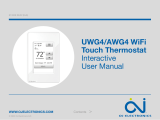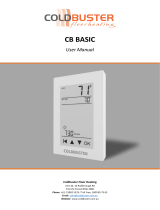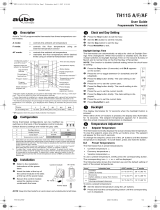
PAGE 2
© 2016 OJ Electronics A/S
1. Contents
2. Menu Overview . . . . . . . . . . . . . .3
3. Introduction . . . . . . . . . . . . . . . . 4
4. General Operation . . . . . . . . . . . .5
4.1. Navigation Buttons . . . . . . . . . . 6
5. Ground Fault: (GFCI/EGFPD) 1/2 . . . 7
5. Ground Fault: (GFCI/EGFPD) 2/2 . . . 8
6. Icons 1/2. . . . . . . . . . . . . . . . . . . 9
6. Icons 2/2. . . . . . . . . . . . . . . . . . 10
7. Startup Wizard . . . . . . . . . . . . . . 11
7.1 Set the language . . . . . . . . . . . 12
7.2 System Test . . . . . . . . . . . . . . 13
7.3 Safety Test . . . . . . . . . . . . . . . 14
7.4 Set the preferred temperature unit 15
7.5 Enter the Distributor ID . . . . . . . 16
7.6 Setting the Load Measurement . . 17
7.7 Set the floor load . . . . . . . . . . . 18
7.8 Set the sensor type. . . . . . . . . . 19
7.9 Set the date . . . . . . . . . . . . . . 20
7.10 Set the time . . . . . . . . . . . . . 21
7.11 Set floor protection . . . . . . . . . 22
7.12 Thermostat activation . . . . . . . 23
8. Programed Heating Schedule . . . . 24
9. Operating Choices . . . . . . . . . . . 25
9.1 Scheduled Operation . . . . . . . . 26
9.2 Manual Operation. . . . . . . . . . . 27
9.2.1 Manual Operation Adjust . . . . . 28
9.2.1.1 Adjust... for a few hours. . . . . 29
9.2.1.2 Adjust... for a few days . . . . . 30
9.2.1.3 Adjust... permanently . . . . . . 31
9.3 Regulator Mode. . . . . . . . . . . . 32
10. Thermostat Setup Menu . . . . . . 33
10.1 Heating Schedule 1/2 . . . . . . . 34
10.1 Heating Schedule 2/2 . . . . . . . 35
10.2 Energy Use . . . . . . . . . . . . . 36
10.3. User Settings . . . . . . . . . . . . 37
10.3.1 Child Lock 1/2 . . . . . . . . . 38
10.3.1 Child Lock 2/2 . . . . . . . . . 39
10.3.2 Display Brightness . . . . . . . 40
10.3.3 Screen Saver . . . . . . . . . . 41
10.3.4 Energy Tari . . . . . . . . . . . 42
10.3.5 Date . . . . . . . . . . . . . . . 43
10.3.6 Time . . . . . . . . . . . . . . . 44
10.3.7 Daylight Saving Time . . . . . 45
10.3.8 Unit . . . . . . . . . . . . . . . . 46
10.3.9 Language . . . . . . . . . . . . 47
10.3.10 Information . . . . . . . . . . 48
10.3.11 Support . . . . . . . . . . . . 49
10.3.12 User Reset . . . . . . . . . . . 50
10.4 Installer Settings . . . . . . . . . . 51
10.4.1 Adaptive Function . . . . . . . 52
10.4.2 Open Window . . . . . . . . . 53
10.4.3 Sensor Application 1/2 . . . . 54
10.4.3 Sensor Application 2/2 . . . . 55
10.4.4 Sensor Type 1/2 . . . . . . . . 56
10.4.4 Sensor Type 2/2 . . . . . . . . 57
10.4.5 Floor Sensor Calibration . . . 58
10.4.6 Room Sensor Calibration . . . 59
10.4.7 Floor Protection 1/2 . . . . . . 60
10.4.7 Floor Protection 2/2 . . . . . . 61
10.4.8 Factory Reset . . . . . . . . . . 62
10.5. WiFi Settings 1/3 . . . . . . . . . . 63
10.5. WiFi Settings 2/3 . . . . . . . . . . 64
10.5. WiFi Settings 3/3 . . . . . . . . . . 65
10.5 Weather Settings . . . . . . . . . . 66
10.5.1 Viewing the weather forecast. 67
11. Factory Settings . . . . . . . . . . . . 68
12. Troubleshooting 1/5. . . . . . . . . . 69
12. Troubleshooting 2/5. . . . . . . . . . 70
12. Troubleshooting 3/5. . . . . . . . . . 71
12. Troubleshooting 4/5. . . . . . . . . . 72
12. Troubleshooting 5/5. . . . . . . . . . 73






















